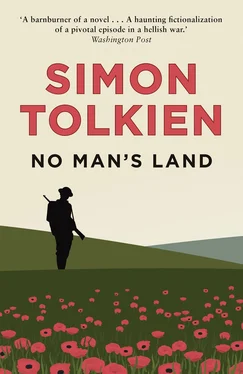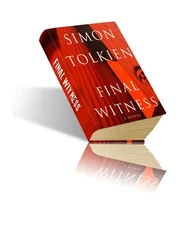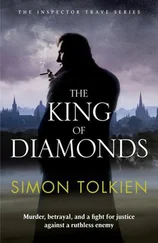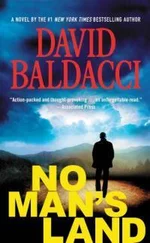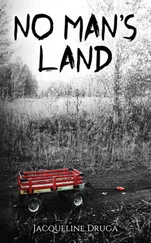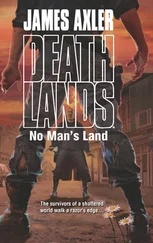Adam had climbed back down opposite Rawdon and now turned half to face him, keeping one hand behind him on the ladder as he tried to measure the distance between them. The light was poor and he couldn’t risk trying to unfasten the lamp from his belt but he guessed that Rawdon was about five or six feet away.
‘There’s a chance,’ he said.
‘No, there isn’t,’ said Rawdon. ‘I’m fuckin’ done for and I’m not takin’ you with me if that’s what you’ve got in mind.’ It cost him an effort to speak and his words came in gasps. Adam wondered how much longer he could hold on.
‘Listen, I think I can get hold of your hand if you reach it out as far as you can. And if I can do that, I can swing you round on to the ladder.’
‘No, you can’t. You’re not strong enough.’
‘Try me,’ said Adam, forcing a smile. And without waiting for a response, he reached out towards Rawdon with his hand, pushing away from the ladder so that his other hand was stretched out behind him, hanging on to the rung.
He was looking straight at Rawdon, willing him to try. He could see the cold sweat on Rawdon’s forehead and the tears that were forming in his eyes. ‘Do it,’ he said, making it sound like an order. And Rawdon closed his eyes and let go, reaching out across the abyss.
Adam felt Rawdon’s hand close on his own in a death grip and the next moment he felt a pull on his arm and shoulder the like of which he had never known before, but somehow they didn’t rupture; somehow he managed to keep hold of the ladder at his back as he swung Rawdon in and felt him stick firm as he caught hold of a rung one or two below where he was standing.
Afterwards they shook, each trembling uncontrollably one above the other as they gripped tight on to the ladder, waiting for their strength to return. And then slowly, very slowly, they climbed the remaining rungs, edging past the empty cage hanging on its steel rope, until they got to the surface and emerged out into the twilight of a day that had come so close to being their last.
‘You saved my life,’ said Rawdon simply as they stood together at the mouth of the shaft, looking back down into the darkness. His voice was quiet and he sounded bemused, as if he was examining a strange artefact he’d just found, uncertain what to make of it.
‘You’d have done the same,’ said Adam lightly.
‘Would I?’ said Rawdon, as if it was a question to which he did not have the answer.
He shook his head and turned away; and stumbled down the stairs to the standpipe at the bottom where he drank greedily before he sank to the ground, dully watching Adam as he did the same. A moment later his eyes closed and he was asleep where he sat, overcome with exhaustion.
Adam could see no sign of anyone at the pithead, but there was a light coming from the stores building. Leaving Rawdon where he was, he pushed the door open: it wasn’t locked – not like the last time Adam had been inside when he’d helped to steal the dynamite for the fishing expedition. That carefree day seemed light years away now, as if it belonged to a different world.
Inside, an area had been cleared in the centre of the floor with the mine equipment pushed back against the walls, blocking the windows, and in the open space eight trestle tables had been set up in two lines facing the door. On each one a man was lying, covered up to his neck by a white sheet that smelt strongly of carbolic acid. Adam stopped in his tracks, unable for a moment to go forward as he wondered if his father was among the dead.
What light there was in this makeshift morgue came from a few oil lamps and guttering candles set up here and there, and the darkening shadows creeping in on the areas of isolated light around the bodies reminded Adam of the Rembrandt paintings of anatomical lessons in seventeenth-century Amsterdam that he had once seen in a book at school. But there was no sign of any doctor here; only Parson Vale, who was trying to console several women who were sitting on folding chairs beside the bodies of their dead husbands or sons. Some were clearly beyond the reach of comfort, crying out their pain as they rocked backwards and forwards, unable to cope with their grief, while at the opposite extreme another woman sitting closer to the door was still as a statue, making no sound at all. Taking a few steps forward, Adam recognized her with a jolt as Annie, and the body beside her on the table was Edgar’s.
It was hard at first for Adam to believe he was dead. He could see that Edgar hadn’t been burnt by the fire; it must have passed him by as it roared down the tunnel after the explosion, not needing to seek him out in his stall because he would have already been gone, overpowered in a moment by the firedamp gas that had suddenly swamped the seam.
Adam felt cold and nauseous. He had never seen a dead man that he knew before and he had to fight for a moment to stay upright before he forced himself to inspect the other tables. As far as he could tell, none of the other corpses was his father’s, but it was hard to be sure as many of the faces were badly burnt and disfigured.
He looked up and saw that the parson was watching him from the other side of the room.
He clearly knew what was going through Adam’s mind.
‘Don’t worry,’ he said. ‘Your father’s all right. Wait for me a minute. I want to talk to you.’
Adam nodded. Relief flooded through him, making him weak at the knees. But he felt guilty when he looked back at Edgar who hadn’t survived but had instead been cut down in the prime of his life. Adam looked at the thick muscles in Edgar’s neck and the broad set of his shoulders. He doubted he had ever seen a stronger man. And yet now this powerful body was no more than a hollow shell, a husk emptied of meaning. Soon it would fall apart and rot, food for worms in the damp ground.
Adam closed his eyes and remembered Edgar’s ebullience: the way he seemed to fill a room, coming out of the scullery in his soapsuds in the evening and squatting before the hot fire to get dry; or singing snatches of old songs in a pitch-perfect baritone as he mended his boots – his voice vying for ascendancy with the hammer.
I’d shake thy hand, lad, but it needs washing first. Edgar’s first words to him came floating into Adam’s mind as he recalled that first morning when he and his father got off the train from London and met the miners coming home from the night shift. And then a year later he had refused to shake Edgar’s hand when they left the house in Station Street. It seemed a petty gesture now.
He glanced over at Annie. She hadn’t moved since he had come into the shed and she seemed completely unconscious of his presence. She was dry-eyed, staring unseeing into the middle distance behind his shoulder. Only her hands were active, pulling repetitively at the stitching of her husband’s cloth cap, which she was holding in her hands. She was wearing her best black dress and a hat decked out with black imitation fruit. He wondered if she’d already known or suspected that Edgar was among the dead when she’d gone to the pit after the alarm was sounded and had dressed up for the occasion. He realized that it was a question to which he would never know the answer.
‘She’s in shock,’ said the parson, coming up to Adam and drawing him aside. ‘Grief can take people this way as well – they just shut down because the loss is more than their minds can accept, at least to begin with. She’ll be better later, I hope.’
‘What about her son, Thomas?’ Adam asked, lowering his voice. ‘He was working with his father last time I was here.’
‘Yes, he was, but he got lucky – I think he’d gone back to fetch something when it happened. So he’ll be able to support his mother. Others haven’t been so fortunate. She’s lost both her sons,’ he said, pointing over at the woman who was crying the loudest, shaking uncontrollably as the sobs were torn from her throat.
Читать дальше
